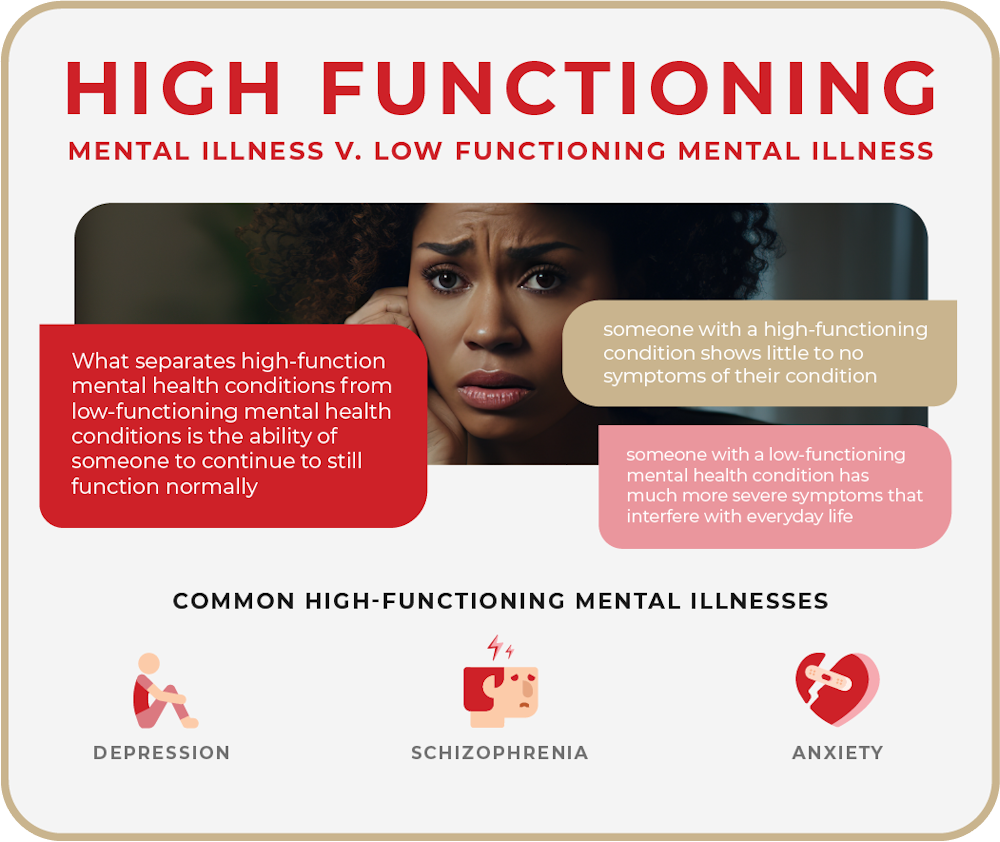What is a High-Functioning Mental Illness?
People might assume that it is easy to identify whether a person is suffering from a mental health condition. Society has taught us that people suffering from issues such as depression and anxiety wear those emotions on their sleeves.
However, that is not always the case. In fact, many people suffer internally from a mental health condition without showing any signs on the surface. This is known as having a high-functioning mental illness.
While high-functioning mental health conditions are becoming more recognized, they can often be tough to spot since the person suffering often doesn’t show any symptoms on the surface. Additionally, since many people who suffer from a high-functioning mental illness are able to go about their day normally, it is still not getting the attention that it deserves.
In this blog, we will discuss what it means to have a high-functioning mental health disorder. We will go over some common examples, and also talk about ways you or a loved one can get help for your high-functioning mental health disorder.
Table of Contents
ToggleWhat Does It Mean To Have a High-Functioning Mental Illness?
As is the case with addiction and other diseases, mental illnesses can vary in severity. Some people might have a mental health condition that is so severe that it prevents them from being able to perform even the most basic tasks. Others might suffer from a mental illness but in a way that doesn’t alter their lives as greatly. The latter is what is known as having a high-functioning mental health disorder.
Someone suffering from this will typically experience less severe symptoms and drawbacks. As a result, they might not show any symptoms or signs that they are struggling on the surface. On the surface, someone suffering from a high-functioning mental illness will often appear as if everything is completely normal or “business as usual”. However, internally they might be dealing with issues such as anxiety or depression.
What’s the Difference Between High-Functioning and Low-Functioning Mental Health Disorders?

As we touched on, someone suffering from a high-functioning mental health disorder often won’t show any symptoms on the surface. In fact, they might even seem like they have life more together than many do. However, internally they are still suffering from a mental health condition.
What separates high-function mental health conditions from low-functioning mental health conditions is the ability of someone to continue to still function normally. Whereas someone with a high-functioning condition shows little to no symptoms of their condition on the surface, someone with a low-functioning mental health condition has much more severe symptoms that interfere with their daily life.
While it might seem odd to say, that’s exactly why high-functioning mental health disorders can actually be more dangerous. Since the person suffering isn’t showing any symptoms on the surface, people around them aren’t aware of their condition and therefore aren’t able to help them. Only the person suffering can know and decide if they want to get help or not.
What Are Some Common Examples of High-Functioning Mental Illnesses?
By definition, anyone who is suffering from a mental health condition that doesn’t prevent them from going about their daily life or that doesn’t involve noticeable symptoms on the surface is suffering from a high-functioning mental illness. That being said, there are certain mental health conditions that are more common to be high-functioning than others.

High-Functioning Depression
Previously known as dysthymia, high-functioning depression is a less severe form of major depressive disorder. A person suffering from high-functioning depression may experience some of the same symptoms as someone suffering from major depressive disorder, however, these symptoms are less severe and don’t prevent the person from going about their daily life normally.
While high-functioning depression is not formally recognized in the Diagnostic and Statistical Manual of Mental Health Disorders, it is still an indication that the person suffering from it is suffering from a form of depression.
High-Functioning Anxiety
Anxiety is a perfectly normal and healthy emotion that we all experience. Anxiety is the brain’s way of telling us that we might be stepping into an uncomfortable situation or that danger might be on the horizon. However, some people experience these feelings even when there is no danger or no uncomfortable situation on the horizon. When that happens, it is typically an indication of an anxiety disorder.
A person suffering from high-functioning anxiety will experience these same anxiety symptoms, however, it won’t be debilitating. An individual with high-functioning anxiety may be able to overcome these emotions and still appear to live their life normally on the surface.
High-Functioning Schizophrenia
Schizophrenia is a psychiatric disorder that changes the way the brain works. It can be highlighted by symptoms such as hallucinations, delusions, and the inability to express emotion. For the majority of people, schizophrenia is so debilitating that it is often hard to get or keep a job. However, some people have schizophrenia and are still able to go about their daily life. Those people are suffering from what is known as high-functioning schizophrenia.
How Can I Spot High-Functioning Anxiety and Depression?
Unlike most cases of anxiety and depression disorders, someone suffering from high-functioning anxiety or depression won’t show any symptoms on the surface. This not only can make it harder for friends, family members, and loved ones to identify, but it can also at times even make it difficult for the person suffering to identify.
Some signs that you or someone you know might be suffering from high-functioning depression include:
- Insomnia
- Low self-esteem
- Decreased appetite
- Inability to express happiness in either their own success or the success of others
- Feelings of sadness or emptiness
- Difficulty concentrating
- Lack of motivation
- Lack of energy
Some of the signs that you or someone you know might be suffering from high-functioning anxiety include:
- Insomnia
- Fear of failure
- Feeling the need to say ‘yes’ to everything
- Overthinking or overanalyzing things constantly
- Dwelling on past mistakes
- Excessive worry
- Nervous habits
Is High-Functioning Mental Illness Treatable?
 Just because someone is suffering from a high-functioning mental illness does not mean treatment is not necessary. Additionally, as is the case with other forms of mental health conditions, many who suffer from high-functioning mental health disorders may also be suffering from substance abuse.
Just because someone is suffering from a high-functioning mental illness does not mean treatment is not necessary. Additionally, as is the case with other forms of mental health conditions, many who suffer from high-functioning mental health disorders may also be suffering from substance abuse.
For those suffering from both a mental health condition and a substance abuse problem, the first step in the treatment process is detoxification.
Detoxing is done in order to rid the body of all harmful substances so that the brain can begin to heal. Drug and alcohol detox should always take place under the care and supervision of trained medical professionals at either a local medical facility, a detox center, or a treatment center that also offers detox such as First City Recovery Center.
Therapy
Therapy is one of the most important components of treatment for mental health conditions, including high-functioning mental health disorders. Psychotherapy, such as cognitive behavioral therapy has been proven to be particularly helpful in treating mental health conditions because it helps the person in therapy identify what exactly lead to the development of their condition while also teaching them healthier and more productive ways to deal with these triggers in the future.
Medication
In some cases, it might be recommended that medication is also prescribed to go along with psychotherapy. Some people might be prescribed antidepressants or anti-anxiety medication in order to help address some of the symptoms associated with their mental health condition. While this might not be as common when treating high-functioning mental illness, in some situations it still might be deemed as valuable.
Do You Suffer From A high-Functioning Mental Illness?
Whether you are suffering from a mental health condition that is debilitating, or you are suffering in a way that isn’t as noticeable, you are still living with a mental health condition and should get the help that you need. At First City Recovery Center we know the importance of addressing not just substance abuse and addiction issues, but mental health issues as well. That’s why in addition to our addiction treatment programs we also offer programs addressing a variety of mental health issues including:- Anxiety
- Depression
- Bipolar disorder
- Post-traumatic stress disorder (PTSD)

MD, Psychiatrist
Dr. Vahid Osman, MD is a psychiatry specialist in Indianapolis, IN.
Dr. Osman completed a residency at Austin State Hospital. He has over 32 years of experience in Psychiatry & Behavioral Health. He is board certified by the American Board of Psychiatry and Neurology.




